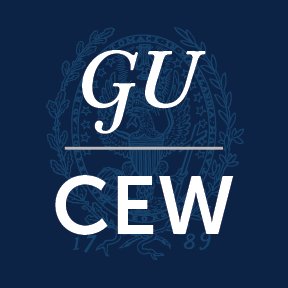
Georgetown CEW
@GeorgetownCEW
Followers
9K
Following
15K
Media
3K
Statuses
21K
The Georgetown University Center on Education and the Workforce (CEW) is a research and policy institute within Georgetown’s McCourt School of Public Policy.
Washington, DC
Joined May 2010
What is a bachelor’s degree worth? This question has taken on new urgency in light of growing skepticism about the value of college. Ultimately, graduates’ lifelong earnings potential depends on many factors—but choice of major can be highly influential.
cew.georgetown.edu
In The Major Payoff: Evaluating Earnings and Employment Outcomes Across Bachelor's Degrees, CEW analysis underscores that a college degree is a worthwhile investment.
0
0
0
Gaps in opportunity begin at birth. Universal high-quality education from pre-K through high school, access to food and affordable housing, and networks of community support are essential to putting children on the path toward healthy and happy adulthoods.
cew.georgetown.edu
The US economy misses out on $11.3 trillion in net lifetime earnings gains due to educational attainment gaps.
0
0
0
Our report examines the benefits associated with increased college degree attainment between 2010 and 2020 and considers the effect of rising levels of college attainment on racial/ethnic and gender gaps in attainment and earnings. Read more here:
cew.georgetown.edu
The US economy misses out on $11.3 trillion in net lifetime earnings gains due to educational attainment gaps.
0
0
0
Civic engagement is the foundation of a healthy democracy. On election day, we encourage citizens to exercise their rights. Get out and vote!
0
0
0
The male-female participation gap in America’s workforce has seen its biggest increase in any year since the 1950s. But not for the reasons you might think
economist.com
Maybe they are becoming tradwives. Or maybe there is a more straightforward explanation
5
11
17
Disparities in degree attainment matter because differences in earnings by degree level are substantial. Yet even when adults from marginalized racial/ethnic groups reach the same levels of attainment as white adults, they do not garner the same earnings. https://t.co/2EGAiHpFEm
0
0
0
Between 2010 and 2020, the proportion of US adults who hold college degrees increased by 6.7 percentage points. As a result, US workers can expect to earn an additional $14.2T net of costs over their lifetimes—money that will bolster the US economy.
cew.georgetown.edu
The US economy misses out on $11.3 trillion in net lifetime earnings gains due to educational attainment gaps.
0
0
0
Creating a more just society in a post–affirmative action landscape will require directly addressing systemic inequalities and their consequences across the education system.
cew.georgetown.edu
Our report finds that American Indian/Alaska Native, Black/African American, and Hispanic/Latino students remain underrepresented in selective college enrollment relative to their share of the...
0
0
0
One barrier to college admissions is perceptions about the cost of college. As the current system is designed, students do not know how much they will be expected to pay. Institutions should take additional steps to achieve price transparency.
cew.georgetown.edu
Our report finds that American Indian/Alaska Native, Black/African American, and Hispanic/Latino students remain underrepresented in selective college enrollment relative to their share of the...
0
0
0
Too many students, particularly those attending open-access institutions, struggle with financial needs that hinder their progress toward earning a degree. https://t.co/qmMUDxTm2l
cew.georgetown.edu
Our report finds that American Indian/Alaska Native, Black/African American, and Hispanic/Latino students remain underrepresented in selective college enrollment relative to their share of the...
0
0
0
Despite numeric increases in enrollment, the shares of American Indian/Alaska Native, Black/African American, and Hispanic/Latino students who attend a selective institution are still disproportionately small. https://t.co/qmMUDxTm2l
0
0
0
Pressures of global competition, mass migration, & economic instability have caused a backlash in many parts of the world, namely a rise in authoritarian leaders. We find that higher education can protect democracy from #authoritarianism. #NHEM @NEAToday
cew.georgetown.edu
Postsecondary education can play a critical role in protecting democratic republics against the threat of authoritarianism.
0
0
0
Open-access institutions would ideally form the backbone of an improved college and career counseling system that blurs the line between high school and college, and between higher education and the workforce. https://t.co/qmMUDxTm2l
cew.georgetown.edu
Our report finds that American Indian/Alaska Native, Black/African American, and Hispanic/Latino students remain underrepresented in selective college enrollment relative to their share of the...
0
0
0
Despite their increasing enrollment at selective colleges and universities from 2009 to 2019, only 14% of all Black/African American students and 16% of Hispanic/Latino students attended these institutions in 2019. https://t.co/qmMUDxTm2l
0
0
0
Higher education should be a beacon of opportunity. Instead, it perpetuates systemic inequities. Eliminating these will require a whole-system approach that improves access at selective colleges and addresses disparate student outcomes at open-access ones.
cew.georgetown.edu
Our report finds that American Indian/Alaska Native, Black/African American, and Hispanic/Latino students remain underrepresented in selective college enrollment relative to their share of the...
0
0
0
What are the nonmonetary benefits associated with higher educational attainment? Longer life expectancy, lower rates of disease, lower levels of incarceration, higher resistance to authoritarianism, and higher levels of civic participation. #NHEM @NEAToday
cew.georgetown.edu
The US economy misses out on $11.3 trillion in net lifetime earnings gains due to educational attainment gaps.
0
0
2
“A small number of selective colleges are launchpads to positions of influence, but these institutions remain highly segregated. This chasm of inequity undermines the goal of the American postsecondary system.”—CEW Director Jeff Strohl. https://t.co/qmMUDxTm2l
0
0
0
CHECK OUT TODAY'S AI STORY- AI Cybersecurity Stocks to Watch and the Race for $234 billion Market by 2032 AI, more than any other technology, has empowered both sides of an industry, from the criminals and bad actors to the companies leading the cybersecurity battle. There is a
0
1
4
Prime-age workers with a bachelor’s degree earn 70% more at the median than workers with only a high school diploma. Yet we find that earnings vary significantly by major. @HigherEdDive covers our new report:
highereddive.com
Workers with STEM degrees earn a median of $98,000 a year, versus $69,000 for arts and humanities majors, according to Georgetown University research.
0
0
0
Our report, "Progress Interrupted," examines admissions trends at a time when race/ethnicity could still be considered in the college admissions process. Read the report and our findings here:
cew.georgetown.edu
Our report finds that American Indian/Alaska Native, Black/African American, and Hispanic/Latino students remain underrepresented in selective college enrollment relative to their share of the...
0
0
0









